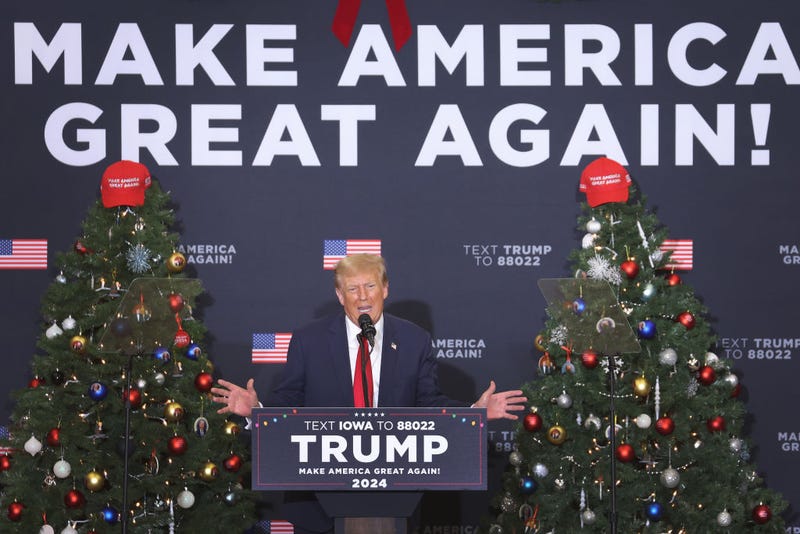
A Colorado Supreme Court has found former President Donald Trump ineligible for the state's presidential ballot, bringing the issue to the forefront in other states including in Minnesota.
The Minnesota Supreme Court previously declined to remove Trump's name from the primary ballot along with courts in Michigan and New Hampshire, making Colorado the first to rule against Trump.
Hamline Political Law Professor David Schultz says this could cause a chain reaction in all states.
"Even though the decision in Colorado is not legally binding on Minnesota, it could have implications in both how the U.S. Supreme Court eventually addresses the issue, and potentially persuasive of a case brought in Minnesota or another state," says Schultz.
A bipartisan group in Minnesota that filed the petition earlier this fall said Trump should not be allowed on the ballot in Minnesota because he violated Section 3 of the 14th Amendment.
The Minnesota Supreme Court did dodge the central question of the lawsuit around the 2021 attack on the U.S. Capitol disqualifying him from the presidency, by ruling that state law allows parties to put whomever they want on the primary ballot.
"It's either a measure for Congress to address in terms of how to interpret the 14th Amendment and whether Trump should appear on the ballot, or conversely, courts might simply say that at the end of the day, it's up to the American public to decide whether he should be President of the United States and not us," Schultz told WCCO Radio after that ruling.
“There is no state statute that prohibits a major political party from placing on the presidential nomination primary ballot, or sending delegates to the national convention supporting, a candidate who is ineligible to hold office,” Chief Justice Natalie Hudson ruled.
If the case does go to The Supreme Court it would put the the the Colorado decision on pause and all states would be required to include Trump's name on the ballot until a decision is made.
Schultz says if the issue reaches the U.S. Supreme Court as the Trump attorneys have already said they will appeal it to the highest U.S. Court, and it's still possible they may rule in his favor.
"It is possible that the court could reach a different conclusion, partly because it's a court that is six to three Republican appointed, three of the justices appointed by Donald Trump himself," explains Schultz.
Trumps legal team have argued that the 14th Amendment doesn't apply to the presidency and they will seek to appeal any disqualification immediately.
The decision from a Colorado court whose justices were all appointed by Democratic governors marks the first time in history that Section 3 of the 14th Amendment has been used to disqualify a presidential candidate.
“A majority of the court holds that Trump is disqualified from holding the office of president under Section 3 of the 14th Amendment,” the court wrote in its 4-3 decision.
Colorado’s highest court overturned a ruling from a district court judge who found that Trump incited an insurrection for his role in the Jan. 6, 2021, attack on the Capitol, but said he could not be barred from the ballot because it was unclear that the provision was intended to cover the presidency.
The court stayed its decision until Jan. 4, or until the U.S. Supreme Court rules on the case. Colorado officials say the issue must be settled by Jan. 5, the deadline for the state to print its presidential primary ballots.
“We do not reach these conclusions lightly,” wrote the court’s majority. “We are mindful of the magnitude and weight of the questions now before us. We are likewise mindful of our solemn duty to apply the law, without fear or favor, and without being swayed by public reaction to the decisions that the law mandates we reach.”
Trump’s legal spokeswoman Alina Habba said in a statement Tuesday night: “This ruling, issued by the Colorado Supreme Court, attacks the very heart of this nation’s democracy. It will not stand, and we trust that the Supreme Court will reverse this unconstitutional order.”
Trump didn’t mention the decision during a rally Tuesday evening in Waterloo, Iowa, but his campaign sent out a fundraising email citing what it called a “tyrannical ruling.”
Republican National Committee chairwoman Ronna McDaniel labeled the decision “Election interference” and said the RNC’s legal team intends to help Trump fight the ruling.
Trump lost Colorado by 13 percentage points in 2020 and doesn’t need the state to win next year’s presidential election. But the danger for the former president is that more courts and election officials will follow Colorado’s lead and exclude Trump from must-win states.
